An intriguing story, and one that had me turning the pages, but some problems in execution keep me from giving this the excellent grade I was hoping for when I started it. A B-.Prominent Attorney's Wife Killed in Bombing!
The morning's newspaper headline leaves Blaine Anderson reeling. Only a few hours ago she'd dragged herself dazed and bleeding from the smoking rubble, but it might as well been a lifetime ago - - because now the world believes she is dead.
Before Blaine can reach her husband, the bomber strikes again. With terrifying clarity she realizes he's bent on wiping out the witnesses to his crime - - and she's one of them. Without money and ID she becomes Mary Blaine, hiding in a homeless shelter, knowing it's too dangerous to go home.
Meanwhile, her husband, Mark, realizes his carefully managed life is beginning to crumble. After years of taking Blaine for granted, he finally grasps how nothing -not even a promising career in politics- is worth it without her by his side. Desperately he searches for anyone who was with Blaine just prior to the blast. But instead he finds something -someone- much more important.
Blaine and Mark Anderson's marriage isn't a passionate one. They've been married for ten years, and it was like this from the very beginning. Blaine loves her husband and knows her husband is fond of her, but their relationship was never about being madly in love. When Blaine suspects she's pregnant, she gets worried, because she knows Mark won't be happy about it. Before doing anything, though, she wants confirmation, so she goes to a downtown clinic to get some tests done.
But before she gets any answers, the clinic gets bombed and Blaine barely manages to crawl out of the wreckage, only to go unconscious in a nearby alley. When she emerges, it's to discover everyone thinks she's been killed. The first thing she does is to go to her husband's office, trying to find him, but before she can do so, she overhears a conversation which makes it clear that if it becomes known that she's still alive, Mark will be in danger.
Obviously, Blaine can't very well go home or approach Mark in public. She decides to stay away until things become clearer, and until the police capture the people responsible for the bombing, and considering she has no money on her and her scratched face, matted hair and ragged clothing make her look like a homeless person, the only option she has is to actually hide out among the homeless.
Meanwhile, Mark is discovering that his wife meant much more to him than he would have thought. With Blaine missing, Mark realizes that he's been taking her for granted, and that he should have taken the time to get to know her. So when details emerge that make him suspect that Blaine might have survived the bombing, Mark will do his best to find her.
The best thing in FMB is the change and growth in the characters and in their romance, even if they're apart throughout most of the book. Blaine starts out as a somewhat wimpy, completely boring person. After a childhood full of rejection, she made herself into a "perfect attorney's wife" persona as a defense mechanism. Only her interest in volunteering with the underpriviledged keeps her from being completely shallow. As for Mark, his childhood was as bad as Blaine's, but his response was to channel all his energies into work, even if this meant completely neglecting his wife. Not that she seems to care much. At the start of the book, Mark and Blaine are practically polite strangers to each other.
But as they spend time apart, they each discover their strengths. Blaine brings out the warrior inside her and learns to survive on her own, while Mark finally realizes that he's been missing out on a lot by being so disinterested, not just in his wife but on the other people around him. And it must be hard to pull off, but Thomas manages to make the relationship between these two grow stronger while they are apart, just as they are growing stronger themselves.
But I mentioned some execution problems, didn't I? The first thing was something that was pretty frustrating, and it was that it never felt to me as if Blaine made that much of an effort to contact Mark. All right, so she was afraid to endanger him, so she couldn't approach him openly, but obviously, given that she tried to phone him a few times, and even left him messages on his lost cellphone, her plan wasn't to keep him thinking she was dead, so that he'd be safer.
And if she really did want to contact him, there were too many options she didn't explore. All she did was call periodically (and not that frequently, either, even when she could have); she didn't really try to intercept him, she didn't try to get someone to give him a message, even when she got friends like Miller and the doc and Mrs. B who could have done it for her without raising much suspicion. In fact, she didn't do a thousand things she could have done to let him know that his wife was all right.
The only reason I can think for this is one that probably explains part of it, but not all, and which is what made much of this story so poignant. Blaine just didn't really feel that Mark would care all that much about her death. To put it simply, considering what their relationship had turned into over the years (and what it had been from the very beginning, really), to Blaine's mind, she wasn't much more than a convenience for Mark. She never would have guessed that he'd be so destroyed by her death, so she wasn't thinking along the lines of "Oh, how Mark must be suffering, thinking I'm dead! I need to let him know I'm alive ASAP, so that he stops suffering".
And to be honest, after reading what their marriage had been like, both from Blaine's and from Mark's POV, neither would I. And yet, Mark's increasing realization of his feelings for Blaine, and of how he'd been taking her for granted, it all rang true, and the poor guy really broke my heart.
Another problem was the Clark Kent/Superman thing. I just didn't buy Blaine would change so much with some small, cosmetic changes. Plus, there's something a bit illogical here: the bomber runs across her by chance in a crowded room and recognizes her, even when he thinks his victim is dead and he isn't expecting to see her, while Mark, looking at a woman closely, trying to decide if she's his wife or not, doesn't? And he doesn't because she's put on a bit of weight, changed her hair-style and colour and is wearing glasses? That strains my credulity.
An even bigger problem was that I thought Thomas screwed up the big moment in which Mark and Blaine meet again. All the book I was anxiously awaiting the moment in which Mark finally has his wife before him and they talk, the moment in which he can finally let her know what her disappearance did to him and how he feels about her. However, when it comes, Thomas pretty much bangs the door in my face. Mark realizes Mary is, in fact, Blaine and the next thing we know, it's the day after. There are some indications that they did talk more after Mark told Blaine he knew who she was (Mark thinks about how he and Blaine agreed to stay separated to stay safe, etc), but we just didn't see that conversation, and furthermore, there are no indications that they talked about anything more than very prosaic plans. Absolutely no talk about how much Mark has missed her, etc., etc.,
Even later, when they meet again, that conversation never happens. Yes, it does become clear that Mark's feelings are not the cool ones Blaine had thought, and that Blaine has become a different, much stronger woman, but we never get that emotionally satisfying conversation I was hoping for.
Eh, well. Even with those annoyances, this was a book I mostly enjoyed. There are some very interesting things here, and Thomas is an author I'd be willing to read more from.
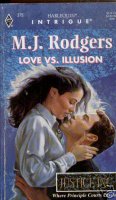 She was on the fantasy ride of a lifetime
She was on the fantasy ride of a lifetime  In the last days of high summer, with lightning striking blue in a black sky, the sorcerer stood on a high cliff overlooking the raging sea...
In the last days of high summer, with lightning striking blue in a black sky, the sorcerer stood on a high cliff overlooking the raging sea... 

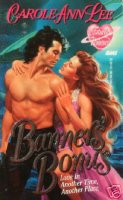 Tressa Loring could think of much better ways to spend her time than traveling through space with an arrogant brute-especially one she had secretly adored for years. But duty forced her to journey with Nick Banner to a far-off world, even as desire led her to unknown realms of passion.
Tressa Loring could think of much better ways to spend her time than traveling through space with an arrogant brute-especially one she had secretly adored for years. But duty forced her to journey with Nick Banner to a far-off world, even as desire led her to unknown realms of passion.  Reckless and wild, beautiful Lily Lawson delights in shocking proper London society -- and will break any rule to flaunt her independence. And now she is determined to rescue her helpless sister from an upcoming, undesired marriage to Lord Alex Raiford, the arrogant Earl of Wolverton.
Reckless and wild, beautiful Lily Lawson delights in shocking proper London society -- and will break any rule to flaunt her independence. And now she is determined to rescue her helpless sister from an upcoming, undesired marriage to Lord Alex Raiford, the arrogant Earl of Wolverton.  As the Minstrel of Kaf, Zayne kept the land of the djinn in harmony. Yet lately, raging desires and unquenchable yearnings were throwing his life into discord and wreaking havoc on his home. He needed a woman to restore balance to his life, a woman with whom he could blend his voice and his body. And according to his destiny, this soul mate could only be found in the strange land of Earth.
As the Minstrel of Kaf, Zayne kept the land of the djinn in harmony. Yet lately, raging desires and unquenchable yearnings were throwing his life into discord and wreaking havoc on his home. He needed a woman to restore balance to his life, a woman with whom he could blend his voice and his body. And according to his destiny, this soul mate could only be found in the strange land of Earth. 
 Eve Dallas has a grisly double homicide to solve when two young lovers—both employees of the same prestigious accounting firm—are brutally killed on the same night. It doesn't leave Eve a lot of leftover time to put together a baby shower for her buddy Mavis, but that's supposedly what friends are for.
Eve Dallas has a grisly double homicide to solve when two young lovers—both employees of the same prestigious accounting firm—are brutally killed on the same night. It doesn't leave Eve a lot of leftover time to put together a baby shower for her buddy Mavis, but that's supposedly what friends are for. 
 Sarhaan and his band of elite soldiers don't know what to make of Caleb when his little spaceship turns up on their viewscreen. Believing that he might be a spy, they bring the junior diplomat onto their stolen spaceship and question him.
Sarhaan and his band of elite soldiers don't know what to make of Caleb when his little spaceship turns up on their viewscreen. Believing that he might be a spy, they bring the junior diplomat onto their stolen spaceship and question him.  Others have claimed to be Amanda Daulton, but now a beautiful, sell-assured woman has stepped out of the shadows of the past, insisting she's the missing heiress to a multimillion-dollar fortune. One look is all it takes to assure the family patriarch that she's his beloved granddaughter. But others at the magnificent Southern mansion called Glory are not as easily convinced, others with much to lose from her sudden reappearance.
Others have claimed to be Amanda Daulton, but now a beautiful, sell-assured woman has stepped out of the shadows of the past, insisting she's the missing heiress to a multimillion-dollar fortune. One look is all it takes to assure the family patriarch that she's his beloved granddaughter. But others at the magnificent Southern mansion called Glory are not as easily convinced, others with much to lose from her sudden reappearance. For two thousand years, Lilith wrought vengeance upon the evil and the damned, gathering souls for her father's armies Below and proving her fealty to her Underworld liege. Bound by a bargain with the devil and forbidden to feel pleasure, she draws upon her dark powers and serpentine grace to lead men into temptation. That is, until she faces her greatest temptation-Heaven's own Sir Hugh Castleford...
For two thousand years, Lilith wrought vengeance upon the evil and the damned, gathering souls for her father's armies Below and proving her fealty to her Underworld liege. Bound by a bargain with the devil and forbidden to feel pleasure, she draws upon her dark powers and serpentine grace to lead men into temptation. That is, until she faces her greatest temptation-Heaven's own Sir Hugh Castleford... 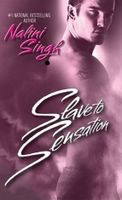
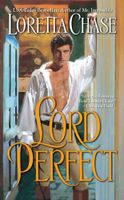
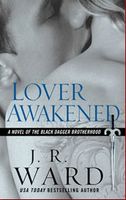



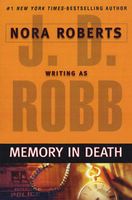


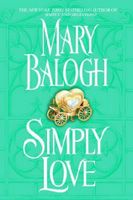


 One of my reading resolutions a few years ago was to try more new authors (new to me, that is, not necessarily debut authors). I did so well that year, that I've kept it up. In 2006, I think I did pretty well. The actual number of new-to-me authors tried went down to 57, but since I read fewer books this year, the percentage works out to be higher than last year, and only a bit lower than my all-time high in 2004.
One of my reading resolutions a few years ago was to try more new authors (new to me, that is, not necessarily debut authors). I did so well that year, that I've kept it up. In 2006, I think I did pretty well. The actual number of new-to-me authors tried went down to 57, but since I read fewer books this year, the percentage works out to be higher than last year, and only a bit lower than my all-time high in 2004.